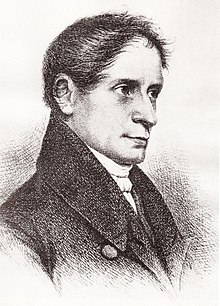Fresh ride
Fresh ride is a poem by Joseph von Eichendorff . It was published in 1815 in the novel Awareness and Present .
structure
The stanza form is an eight-liner, as a double quatrain from Trochaic four-cursors . The cadences change from female to male in the cross rhyme of the figure ababcdcd. The tense is the present tense, with which the euphoric feeling of spring will never lose its validity.
text
The spelling follows the quoted text edition, p. 185, 1. Zvo
Fresh ride,
balmy air flows in blue, it should be
spring, spring!
The sound of horns shot
towards the forest , courageous eyes light shine,
And the confusion
becomes colorful and colorful , A magical wild river,
Down into the beautiful world,
this stream of greeting beckons you.
And I don't like to keep myself!
Far from you the wind drives me
, I want to ride on the river,
Blissfully blind from the shine!
A thousand voices beckoning to beat,
high aurora blows flaming,
drive to! I don't like to ask
where the journey ends!
interpretation
In his review, Helmut Koopmann reveals the meaning of the poem from the above-mentioned novel “Awareness and Present” , in which the verses are inserted in “an infinitely supple, adaptable language”. It is a pagan song. The one who wrote it and presented it to Rosa is the Pagan Romana. Both countesses go the wrong way, each for themselves. Countess Rosa, the lover of the hero of the novel Count Friedrich, lets herself be seduced by the lustful prince. However, she is married by the seducer. Count Friedrich does not allow himself to be seduced by the passionate, Amazonian, freedom-loving Countess Romana. The beautiful woman then goes mad, sets her lock on fire and shoots herself. The Countess Romana's “awakening to life”, introduced in the poem through the spring season, had begun so hopefully. But with all the joy of departure, it was the breakout of a garden of Eden. The wind that caught Romana drove her out of the garden of her well-protected childhood into a wild world in which she perishes. According to Koopmann, the poem is a memento mori before the abyss into which falls, which "overruns". Eichendorff warned against apostasy from religion. In the same breath, the poet condemns the fateful journey on which the western world set out at the end of the Middle Ages. In this way, humanity has lost its “original harmony” and is heading towards its “self-destruction”. However, nature is man's friend. This is how one recognizes the romantic relationship of the poem.
Quoted text edition
- Premonition and present. A novel. With a foreword by de la Motte Fouqué. In: Wolfgang Frühwald , Brigitte Schillbach (ed.): Joseph von Eichendorff. Premonition and present. Stories I (= Joseph von Eichendorff. Works in five volumes. Volume 2). Deutscher Klassiker Verlag, Frankfurt am Main 1985, ISBN 3-618-60120-4 , pp. 53-382.
literature
- Helmut Koopmann : Romantic journey through life. In: Wulf Segebrecht (Ed.): Poems and interpretations. Volume 3: Classical and Romantic (= Reclam UB. Vol. 7892). Reclam, Stuttgart 1984 (new edition 1994), ISBN 3-15-007892-X , pp. 293-305.
- Horst Joachim Frank: Handbook of the German strophic forms. Hanser, Munich; 2nd edition, Francke, Tübingen 1993, ISBN 3-7720-2221-9 .
Web links
- The text at Zeno.org
- Fresh ride in the Gutenberg-DE project
